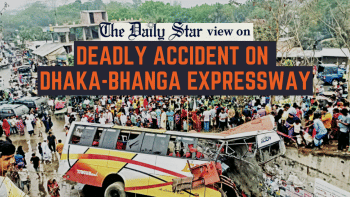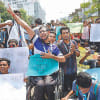Column by Mahfuz Anam: Not road accidents, but ‘murder’ by neglect
A death is an accident only when it occurs in spite of all logical, scientific and experience-based steps taken to prevent it. But if the possibility for it to occur exists in every turn of the system, and no step is taken to prevent it in spite of official findings, public outcry and media reports over the years, then it is no longer an "accident," but "murder" by neglect, committed by the authorities whose responsibility it is, by law, to prevent that. The people in charge should be held culpable for gross negligence and charged as such. That would happen if we had the rule of law operating independently of power.
The bus that killed 19 people and injured at least 25 others on March 19 had killed three others and injured many only four months back, in November, for which its registration and route permit had been suspended. The bus should have been off the road months ago and in police custody, as all vehicles involved in fatal accidents are. But not only was the bus returned to its owner, but they were allowed to run it on a regular basis.
According to the survivors, the bus was speeding from the start and passengers were heard shouting at the driver to slow down. Instead, the driver further accelerated when he got on to the expressway, because his higher pay depended on the number of trips he could make. Who cared about the passengers' lives? Bribe would solve everything.
Every time a tragedy occurs on our roads and highways, we report that most buses don't have the necessary papers for them to be in service – most vitally, no "fitness certificate" that proves their roadworthiness. We also report that the fitness-certificate-issuing personnel and machines are inadequate to meet the demand. At the moment, there is only one Vehicle Inspection Centre (VIC) in the whole country, inspecting about 100 buses and trucks daily out of 229,369 buses, trucks, and minibuses. Why their capacity is not increased and more such centres are not set up all over the country is a question to which we have received no answer. It may not be inappropriate to conclude that the buses that ply on our roads are most likely unfit to carry passengers, and as such are potential "killing machines." But, of course, bribes can solve everything.
We have also reported over the last decade, if not longer, that most bus drivers are without licence. Many of them carry fake ones because it is faster and easier – not to mention cheaper – to get than the real ones. Again, why this situation is not addressed with all the digitalisation that is going on is a question that is never answered. Maybe we are forgetting the magic of bribes.
Most drivers have only a rudimentary knowledge of driving and perhaps no awareness or training about special conditions, such as driving in the rain when roads get slippery and traction of the tyres with the road surface is far weaker. Driving in tropical Bangladesh without this particular training is asking for "accidents" to happen.
Above all the laws, regulations, practices, government directives – above everything – operates the "law of bribery." It is far more effective, fast and accountable than any law in our statute book.
We import the chassis for our buses. The rest is built here – body, seats, and all the safety measures. It is a highly technical task given that a safe balance needs to be ensured between the strength of the material used, the weight it can carry, the impact on the frame when on a curve especially when the bus is full, the speed-weight ratio while driving, pressure on the tyres during a sudden brake with a full load of passengers, passengers being seated or standing, etc. All of these are vital elements in preventing an accident. What are the compliance standards to be met when a bus is registered? Are those who monitor compliance appropriately trained?
There is nothing called a "health check" of the bus drivers, especially their eye sights and whether they need glasses. This is especially true for those who drive at night. Random studies have revealed that about 60-70 percent of the drivers need glasses and suffer from degrees of night blindness.
Then there is the issue of working hours. There is hardly any mandatory rest time for bus drivers. Often they fall asleep while behind the steering wheel as owners prefer to pay "overtime" rather than hire an additional driver, which could save lives. We had cases where the accident occurred because the conductor was driving the vehicle instead of the driver.
Name the possible violations that can occur in any road transportation system, and we have it. And the main reason is the magic of bribes.
Above all the laws, regulations, practices, government directives – above everything – operates the "law of bribery." It is far more effective, fast and accountable than any law in our statute book. The Daily Star investigation has revealed that a mobile network is in operation that extracts monthly "fees" from buses and trucks proportionate to their size and the number of trips they make. Something like a "mobile app" exists that has numbers of all the buses and trucks on whom these "fees" are imposed. Payment is noted on the app and can be verified by designated traffic officials in any part of the city. So, any defaulter is immediately identifiable and punishable. The collection is done digitally and is shared according to the hierarchy of the institution.
Widespread bribery destroys the whole legal edifice and is the main reason why, after decades of exposure by government investigations and media reports, nothing has changed. The rationale is impregnable. The more bus owners break the law, the greater is the hold of the law enforcers on them and stronger is the need to bribe. As many owners have said to the media, albeit anonymously for fear of repercussions, "We have to pay bribe anyway, regardless of having all the papers or not. So why get papers for which, again, we have to pay bribe on top of government fees, which have grown increasingly higher." This network of bribery is known to all. The power dynamics is such that the government prefers to look the other way.
The stark fact that stares us in the face is that as passengers, when we board a bus, we have no guarantee about what should be our fundamental right – the right to a safe journey. We do not know if the bus we are boarding is registered or plying illegally. We do not know if the bus is fit for the road. (In the accident that killed 19 people, the media reported that the driver was told about a problem with the brake, and that it may fail. He decided to fix it upon return to Dhaka). We do not know if the bus driver has a valid licence. We do not know about the state of his mind, health, eyesight and whether he is drunk – a fact that is vital for night-time driving. In fact, we know nothing and also cannot ask for fear that we may be bumped off because we appear to be too nosy.
All this happens and has been happening over the years because those who rule us (meaning all governments) do not think much of our right to life.
According to Bangladesh Jatri Kalyan Samity (BJKS), a private body set up to protect passengers' rights, 39,522 people have been killed and 58,791 injured between 2018 and 2022 in 28,299 cases of road crashes. The figures were compiled from media reports. Police say 20,413 people were killed in 21,625 accidents during the same period, based on the cases filed with them. Not all accident victims file cases with the police due to various reasons; hence their number is lower.
If we take the BJKS figures, we get an annual death figure of nearly 8,000 (as per police, it would be 4,000) due to road crashes. According to the UN human rights office (OHCHR), the non-combatant deaths in the first year of the Russia-Ukraine war has been confirmed to be at least 8,000. Just the deaths on the roads of a country in peace becomes comparable to a country under regular bombardment by a foreign aggressor. What an irony. If we take the police figures, then the death toll is half. Even then, the irony remains just as striking.
Two things need to change: respect for human lives, and our government's accountability system. We know a lot of lip service will be paid for the former and even greater volume for the latter. Thus, we will continue to live in our make-belief world while more Bangladeshis will die – not in any foreign land or due to any aggression, but on our roads.
Mahfuz Anam is the editor and publisher of The Daily Star.

 For all latest news, follow The Daily Star's Google News channel.
For all latest news, follow The Daily Star's Google News channel. 











Comments